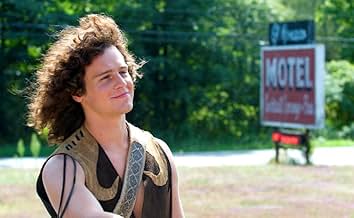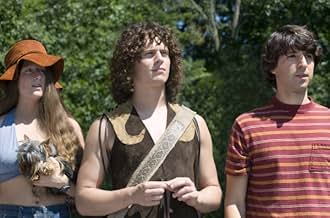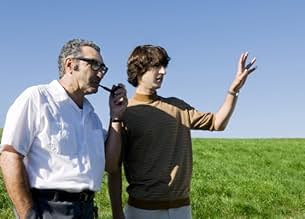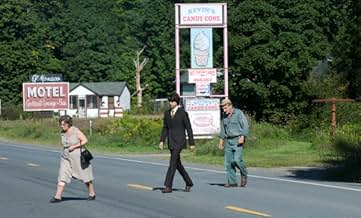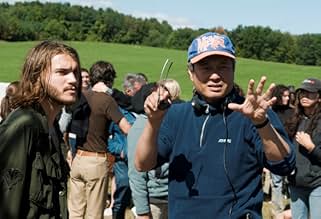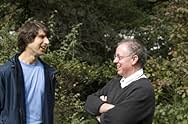Em 1969, um jovem oferece a área do hotel dos pais aos organizadores de um show de rock, sem saber que o evento é o Woodstock.Em 1969, um jovem oferece a área do hotel dos pais aos organizadores de um show de rock, sem saber que o evento é o Woodstock.Em 1969, um jovem oferece a área do hotel dos pais aos organizadores de um show de rock, sem saber que o evento é o Woodstock.
- Direção
- Roteiristas
- Artistas
- Prêmios
- 8 indicações no total
- George the Doorman
- (as Takeo Lee Wong)
- Direção
- Roteiristas
- Elenco e equipe completos
- Produção, bilheteria e muito mais no IMDbPro
Avaliações em destaque
It's basically about the people behind the scenes at Woodstock (we never see anyone famous, aside from certain semi-figures like Michael Lang and Max Yasgur, portrayed by actors), specifically the young guy Eliot who got together the Woodstock-financial people to his small town as part of Bethel, New York, and helped also to give (politely putting it) a boost to his parents' motel business. We see some of the ups and downs, the downs being things like gangsters trying to muscle their way into the earnings of the thousands of people flocking upstate to frequent the motel (and the up of getting 'security' with transvestite Liev Schreiber in an awesome performance), or just with Elliot's parents and how their attitudes stay mostly the same- what's with these damn kids and their hair and sex and drugs anyway- until towards the end of the three days of peace/love/music.
It's a funny movie for at least a good amount of its run-time. The writer Schamus knows how to milk some laughs out of small-town fears and those scenes of freak-outs that shake up the quiet veneer of rural upstate New York. One good example of this are the folks in the 'theater troupe' who live in Elliot's barn and who remind one of the mime troupe from Easy Rider (lots of naked reenactments of Chekhov). And I even liked how Martin navigates himself in scenes where he has to act perplexed but not show it too much like, "oh, hey, lots of hippies, OK, got to get back to work, whoa!" When it comes time for the more dramatically demanding scenes from Martin (a relatively inexperienced actor and mostly comedian by the way) he falls flat, or looks wonky when tripping his ass off with Paul Dano - a weird but affecting scene, by the way.
Lee decided, more or less, to just take it easy this time around. After the heavy head-trips of Hulk, Brokeback Mountain and Lust Caution, the guy needed to have a laugh, and what better way than to have some good times and breezy moments in reflecting on the one time hippies didn't get stomped down by cops or just wear lots of flowers in their hair. And when its airy and fun it works. When it tries to add some complexity (i.e. a gay innuendo moment is put out there and then never really mentioned again much to my dismay) and starts to get a little preachy towards the last quarter with Elliot having to come to terms with his life and working at his parent's motel (and discovering a dark secret about his rambunctious, irascible old Russian-Jewish mother played respectably by Imelda Staunton) it falls flat on its face. But its worth watching for those little moments - like when Elliot rides on the back of the motorcycle cop through the dense traffic of the road to the Woodstock concert. It's like the good-natured version of the traffic jam from Godard's Week End: less a-holes and more hippies.
I had been looking forward to "Taking Woodstock" since I first read that it was in production. I was particularly eager to see Demetri Martin in a starring role; I've admired him for some time. I've also spent quality time in the Catskills--I love that part of the country. Lee's film certainly captures the beauty of White Lake, and generally recreates the groove and vibe of a specific time and place, but the narrative seemed somehow disjointed (unintentional pun) There seemed to be too many empty moments substituting for poignancy, and undeveloped stories that might have added a bit more depth to Lee's tale.
Demetri Martin as Eliot Teber, was adorable but I was frustrated by his poker face (something that makes his stage comedy hilarious). I enjoyed Liev Schreiber whose drag was not only believable, but also compelling. Henry Goodman, as Eliot's beleaguered father, was also finely developed, but Imelda Stauntan played his mother as a shrewish fishwife with virtually no redeeming character qualities. Not even after pot brownies.
Seeing "Taking Woodstock" makes me miss my long lost soundtrack of the original concert, something I shall remedy this weekend. I'm also eager to watch the documentary again with it's hippie-trippie split screens and portraits of long gone poets, artists, and other kindred spirits.
But if you want to get a feeling of what Woodstock meant on a personal level, then Ang Lee's your man and you've come to the right place.
How Lee managed to film this recreation without using real footage, I have no idea. That's apparently what he did.
There in a number of shots is the hillside, mud and slop, with the stage below. The few food stands and portable johns at the top of the hill. The winding pathways through the side venues of jewelry, art, a class for this and a political table for that. The long narrow road that still leads off of New York State Route 17B to the Yasgur hillside where it happened.
It rained a lot, but there was sun, this was mid-August and Lee bathes us in the warm glow of peace. Especially true to the event as I remember, the state cop who returns a peace gesture, the locals making sandwiches and offering water from hoses.
Everyone who was there and lucid has a personal remembrance. Mine began on Friday evening with air mattresses not more than 50 feet from the stage and ended with the sacrifice of a blanket abandoned on the mudslide the hill had become by early Sunday morning. In between, I managed to shuttle down state route 55 and into New Jersey the back way, after the music ended Friday night, Saturday morning. Then back from New Jersey up the same road and finally ending about two miles the other side of the concert where the vehicle stayed untouched until it was reclaimed near dawn on Sunday.
By that time, all though I'd only had a few generous puffs of weed, freely offered by those who had some, I was hearing double and it was time to pack it in.
Yes, the brown acid warnings from Chip Monck (name?), the event "voice" echo'd in the acid trip of Demetri Martin, the young son who blunders into inviting the event to White Lake. The colors and details are incredible as seen from his eyes, slowly beginning to shift and then expanding until the hillside is undulating in waves around the lit stage below. A remarkable shot.
Martin won't win any academy awards; Imelda Staunton might for her portrayal of his paranoid Jewish mother who has hidden a fortune while her rundown motel is nearing foreclosure. And an honorable mention should go to Liev Schreiber as the cross-dressing former Marine who provides security at the motel.
Stereotypes? Sure. Few hippies ever were as mentally vacant as the Earthlite players. Did anyone buy Emile Hirsch's early post-Vietnam anguish? Fortunately, it was left on the doorstep of the main film and Hirsch's character later rings true. Just a high school buddy come home.
But see the film for its personal feel, very true to the event. The wish that Dylan would arrive. The helicopter flights to the medical tent. (only a small number of half-a-million needed any treatment at all.) The question, what about the boys in Vietnam. As one girl says on 17B, "Wish they were here." I was back just a little more than a week. Went with an Army buddy I'd never see again. Yet no one gave us grief for our short hair, mandatory to get out of Vietnam.
The music? Well, Arthur Lee and Love are the perfect accompaniment to the acid trip inside the bus (they never played at the festival.) When the early strains of Friday night's music begin to waft over an idyllic lake where dozens of kids bathe nude, it's Arlo Guthrie and I caught myself thinking, damn, it was dark when Guthrie appeared. But that was forty years ago and the memory can't be trusted.
Just the personal feeling. And despite some of the weaknesses in the subplot, Ang Lee did get the feeling right.
For the personal memories, he absolutely nailed it!
In a recent interview with Charlie Rose, Quentin Tarantino remarked at how hackneyed biopics are. He suggested the best way to depict the life of Elvis would be to make a movie about one day in the life -- say, the one when The King walked into Sun Records the first time. Lee takes a similar approach to the enormous muddy happening of August 15-18 1969 (this film is a 40th-anniversary celebration). After all it's been thoroughly covered by documentary filmmakers, and most of the acts were thoroughly filmed and recorded. But 'Taking Woodstock' partly trumps that real footage by depicting how the happening built like an invasion, focusing on some of the locals and the promoters and a couple of the acid heads but never even focusing on the stage at all.
This might sound like a Robert Altman knockoff, but it's really quite different. Lee isn't trying to build up Woodstock through lots of vignettes and pieces. This is more like Tolstoy's vision of the Battle of Waterloo, but instead of the battle itself, the distant noise and tumult is that of a concert with thousands swarmed around it. That's true for a moment or two, at least, and those moments are haunting. But Ang Lee is no Tolstoy (though he did his own peripheral (Civil) war picture in Ride with the Devil). In the end he doesn't focus on the battle at all. Though Lee's young protagonist, Elliot Teichberg (Demetri Martin), a gay Jewish every-youth and the dutiful son of an impoverished middle-aged couple whose decrepit motel has useless pretensions to being a Catskills resort, is depicted as making it all happen by, as head of the minuscule township's Chamber of Commerce, linking up charismatic, bushy-haired young promoter Michael Lang (Jonathan Groff) with enterprising dairyman Max Yasgur (Eugene Levy), Ellie remains a peripheral figure of the concert, not even the witness of any of the 32 acts performed on stage. Ang Lee's new film lacks the somewhat hackneyed solemnity and pretension of his (admittedly far more emotionally powerful) 'Brokeback Mountain' or (much more stylish) 'Lust, Caution,' but his idea of depicting a great event, like Breugel, by magnifying peripheral figures, is a nifty one.
Elliot Teichberg is the main such Breugel figure, but his parents, the long-suffering Jake (Henry Goodman), and the rigid, paranoid Sonia (Imelda Staunton) loom large for him and us, humble laborers who make the crucifixion come to life. So do the damaged but charismatic young Vietnam vet Billy (Emile Hirsch) and Vilma (Liev Schreiber), the drag queen security guard who's a link with Ellie's New York life as a budding interior decorator, and with the Stonewall riots that had happened just a couple weeks earlier when Elliot was in Lower Manhattan. And there are plenty of others, notably the VW Guy (Paul Dano) and VW Girl (Kelli Garner), who start Ellie on a wonderful acid trip in their van, becoming his guides on an introductory tour of psychedelics. Yeah, "you had to be there," but as hackneyed as the Trip trope is, this is a good one: in its details as in its overall approach, 'Taking Woodstock' often succeeds because it doesn't try too hard and is cozy, offhand, and humorous.
The Sixties aren't about heroics or style, but about getting down, smashing barriers, breaking free -- way-stations of the romantic experience and milestones in any coming-of-age. Woodstock didn't really happen on the stage but in the mud and vans and tents, and Lee shows it that way. Its realities also included an insufficient number of Porta Potties, and townspeople raging at Elliot and Max for making the event happen but then charging big fees for cabins or sandwiches or a drink of water. Elliot's own mother is one of these. But then, somebody gets Jake and Sonia high and they dance in the rain. The motorcycle cop comes to do crowd control and ends up wearing a flower and giving rides. It's corny, but it happened. On the other hand, the borderline caricature depictions of Jews, Schreiber's amiable but overly broad transvestite, and even Emile Hirsch's clichéd, if lively, battle-scarred vet, all could have been thought through better.
Broaching such large events even peripherally, Lee and his writers, James Schamus, Elliot Tiber (author of the source memoir) and Tom Monte, arguably do owe us a bit more of the sex, the bad trips, and the music itself -- which can't be left outside the story of a great concert, whether its protagonist got to the stage or not. If you look at the real people -- Michael Lang, for instance -- they were rougher and sexier than anybody in this movie. The images of Elliot Teichberg's coming-of-age are as lightweight as everything else, and in the superficial sketching of his gayness the movie is as bland as the ditsiest biopic. 'Taking Woodstock' is a sweet, gentle, easy take on events. But remember that it's a coming-of-age comedy that happens in the midst of a tumultuous event, and you'll see that the light touch is not invalid. This was not the great Bad Trip concert; it was the great Good Trip concert. And the light touch allows the film to feel comprehensive with delicacy and keep its focus on the young man's sensibility.
Você sabia?
- CuriosidadesAccording to the Washington Post, screenwriter and producer James Schamus told reporters at the Cannes Film Festival that the biggest challenge in casting extras for the movie was to find people "who were not working out all the time, and who still had pubic hair."
- Erros de gravaçãoArlo Guthrie was heard singing "Coming Into Los Angeles" in daylight. When the 1969 Woodstock concert first took place, Arlo came on stage at midnight right after Melanie.
- Citações
[the Chamber of Commerce discussing tourism ideas]
Frank: Well, okay. We got a lot of dairy farms around here, right? And a fair number of bulls. Okay, you've all heard of the running of the bulls in that town in Spain, Pampoona.
Elliot Tiber: Pamplona.
Frank: Well, no one's doing one in the Catskills. Seems to be a big draw over there.
Annie: It would be very amusing to see all those Jews from Levitsky's summer colony, you know, the ones with the black top hats and the curls, running for their lives chased by our local livestock. Wouldn't that be a wonderful sight!
- Cenas durante ou pós-créditosThe Focus Features logo has a psychedelic kaleidoscope design and plays a rock version of the theme music.
- ConexõesFeatured in At the Movies: Cannes Film Festival 2009 (2009)
- Trilhas sonorasHow Could We Know
Written by Jamie Dunlap, Stephen Lang and Scott Nickoley
Performed by Lori Mark
Courtesy of Marc Ferrari/Mastersource
Principais escolhas
Detalhes
- Data de lançamento
- Países de origem
- Central de atendimento oficial
- Idioma
- Também conhecido como
- Taking Woodstock
- Locações de filme
- Valley Rest Motel, New Lebanon, Nova Iorque, EUA(El Monaco Motel)
- Empresa de produção
- Consulte mais créditos da empresa na IMDbPro
Bilheteria
- Orçamento
- US$ 30.000.000 (estimativa)
- Faturamento bruto nos EUA e Canadá
- US$ 7.460.204
- Fim de semana de estreia nos EUA e Canadá
- US$ 3.457.760
- 30 de ago. de 2009
- Faturamento bruto mundial
- US$ 9.975.737
- Tempo de duração2 horas
- Cor
- Mixagem de som
- Proporção
- 1.85 : 1
Contribua para esta página








